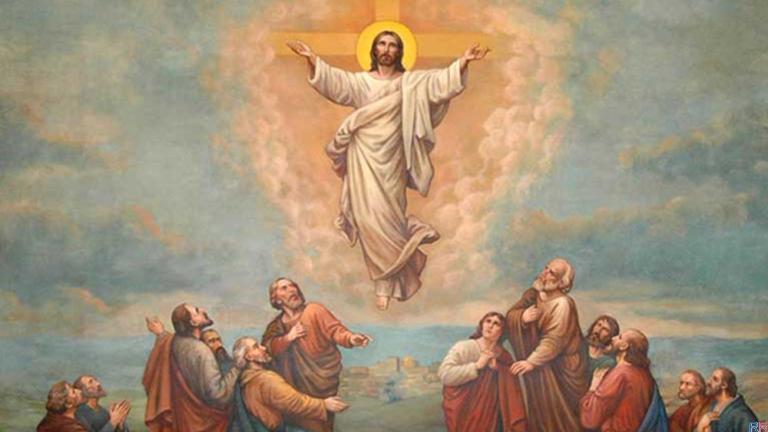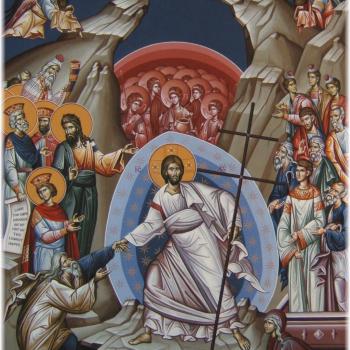“…he ascended into heaven and is seated at the right hand of the Father”
There is a school of thought that argues the church is unnecessarily obsessed with dogma. Christianity is a way of life, not a body of beliefs – so the argument goes. And, for that reason, there are those who think that the Nicene Creed should be cut from our liturgy. Emphasize the experience, set aside the unnecessary, distracting theology.
There are countless problems with this kind of reasoning. But it is enough here to point out that spiritual experiences presuppose a dogma, a body of beliefs. No matter what you do to sever the connection between the two, just to answer two, basic questions, “What are we doing when we celebrate the liturgy?” and “Why should we celebrate it at all?” requires dogma – beliefs, convictions. To offer an answer to those questions, even the simplest of answers, requires beliefs.
The architects of our liturgy understood this, and they knew that if the liturgy was separated from that basic information, the worship of the church would drift and become incomprehensible to subsequent generations of believers. So, the Nicene Creed appears in middle of our liturgy, between the proclamation of the word and the celebration of the Eucharist, not as an effort to foist a set of propositions off on the congregation, but to remind the baptized what it is we are celebrating and why. As such, the Nicene Creed isn’t just dogma, it is an outline of what is necessary for salvation.
But there is probably no more obscure line in that creed than the words, “…he ascended into heaven and is seated at the right hand of the Father”. Like most of us, I once assumed that the language the Creed uses was just a bit of simple stage directions. After all, in a play the actor always “exits stage left” or “stage right” after completing his or her lines. Jesus couldn’t do that very well. So, I thought, “stage up” is really the only place he could go, and that made it possible for the creed to get on with telling the rest of the story.
That, however, is not why the Ascension appears in the creed. Along with the Incarnation, Crucifixion, and the Resurrection, the Ascension is part and parcel of what the early church described as the “saving work of God in Jesus Christ.” It took time for me to discover this, in part because some of the preachers that I heard when I was young, were people who thought that dogma was a bad thing. But the other reason was that those who thought dogma was a good thing, often got some of it wrong.
Most of us, I think, are reared on bad dogma. We know that the world is broken. We know that it needs healing. But the way in which God’s effort on our behalf has been described leads us to believe that Jesus takes on human flesh, suffers punishment that God the Father would really like to inflict on us, and then he is raised from the dead to let us know that now that the Father has decided not to punish us, and – oh, by the way – we also get to live forever.
But according to the Creed that isn’t it at all. From the vantage point of the Creed, God made us for glory and loves us more than we love ourselves. But our choices have jeopardized God’s hope for us, giving death power over us and everything we touch. So, in Christ, God becomes “incarnate from the Virgin Mary”, by taking on our existence. In human flesh he lives the life of glory that God wants for us: a life lived out of an immediate apprehension of God’s will – filled with compassion, truth, beauty, love, and mercy. That life leads him into a confrontation which appears to end in his crucifixion, but – in the greatest reversal of fortunes ever – God uses his death to conquer death and his victory is celebrated in the Resurrection. But even that isn’t enough, according to the Creed. Don’t take this language too literally, but the idea is this: If God “came down” and took on human flesh, the process of rescuing us from the power of death is not complete until our flesh is taken “back up” into the life of God.
As I’ve said before, think of Jesus as “the ultimate first-responder”. He enters our lives, with the house burning down around us. He risks everything, including death to retrieve us, and he emerges from the flames to live again. But that task is not complete if he does not carry us out of the house into the light and safety of a new day.
What does this mean for us? It means that Christ’s ascent is our ascent. His path back to God is our path to God. His return to glory is the beginning of our glorification. That is good dogma and, like all good dogma, it is about hope, life, and vocation:
It is word of hope because the Ascension reveals that we do not face the darkness of this world alone. There is a way out – and contrary to popular belief – you can go home again.
It is a word of life because the Ascension reassures us that we are not without redemptive hope. We can live into the glory that God intends for us. Our failings and shortcomings do not foreclose on that possibility, and Jesus shows us the way, clothed in our humanity.
It is also a word of responsibility because we have been blessed that we might be a blessing. The life and the message of the church is meant to point through the flames and smoke of our lives and our world to Jesus.
It is the end of a long week, a hard week. A hard week for the people of Ukraine. A hard week for the people of Uvalde, Texas.
I am thankful for this:
That the Gospel is not a word of optimism – the empty reassurance that things will get better. Plainly – they may not.
I am thankful for this:
That the Gospel is not the false promise that good things happen to good people and bad things only happen to those who do bad things. Plainly – they do not.
I am thankful for this:
That there is a way through, out, and back to God’s hopes for us and that we have been called to point the way. For – plainly – that is the church’s dogma and vocation.
Let us live out of that conviction and calling. Let us open ourselves to the work of the Holy Spirit. Let us live in ways that conform to the promise, “You can go home again” in all of the transformative and hopeful senses that promise is offered.
Lord Jesus Christ, victor over the grave, author of our salvation, risen, resurrected, and ascended Savior, speak a word of hope and life into our existence, and lead us through the chaos of our lives that we might be clothed in your glory and witness to your way. Now and forever more, world without end. Amen.













